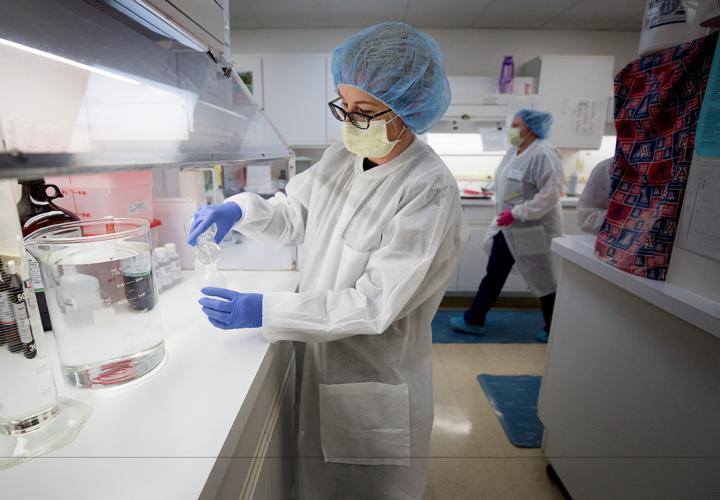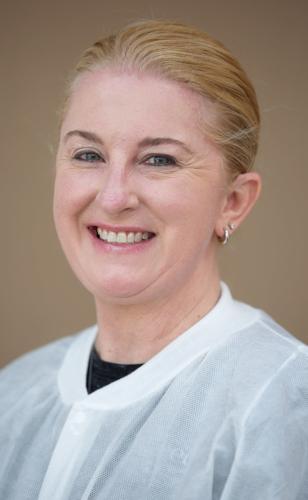A Tucson pharmacy is doing its part to help keep the coronavirus at bay by mixing its own, high-quality hand sanitizer even as most stores are sold out of mass-produced sanitizer.
Reed’s Compounding Pharmacy, 2729 E. Speedway, is selling and donating bottles of alcohol-based hand sanitizer it is making under authority granted by the U.S. Food and Drug Administration to compounding pharmacies, said Dana Reed-Kane, the pharmacy’s co-owner.
Compounding pharmacies mix drugs from existing approved compounds and make special drugs prescribed by doctors in dosages or forms that are not generally available, and also routinely make doses for veterinary use.
In response to requests from the Alliance for Pharmacy Compounding and other industry groups, the FDA relaxed its guideline to allow compounding pharmacists to make hand sanitizer without prescriptions to address an ongoing nationwide shortage, Reed said.
“We are the most accessible health-care providers, and we are also filling critical needs at this time because patients are scared they aren’t going to have access to their medications,” she said. “As compounding pharmacies, we have the training, the facilities, the materials in order to compound hand sanitizers.”
Reed’s joins many other compounding pharmacies nationwide that are making sanitizer to donate to first responders and supply to the public.
Reed said her pharmacy is making high-quality hand sanitizer in batches of seven gallons, enough to make about 225 four-ounce bottles that it will donate to users such as first responders and sell to the public.
Reed’s recently donated 20 bottles to the Boys and Girls Clubs of Tucson, which is helping to take care of first responders’ children, Reed said.
The pharmacy also plans to donate bottles to the Pima County Health Department and the Red Cross, said Reed, who got her pharmacy doctorate from the University of Arizona and co-owns Reed’s with her father.
For sales, the sanitizer doesn’t come cheap – each four-ounce bottle costs $9, largely because of the high cost of the ingredients, Reed said, adding that sales are limited to two per customer.
Reed’s has supplied its sanitizer to a local hospice, a home health-care business and an air-conditioning contractor for its repair trucks, she said.
“So many businesses are essential businesses but they just can’t get it,” Reed said.
The FDA’s initial guidelines allowed distillers of alcoholic beverages to make sanitizer with their own distilled ethyl alcohol, but pharmacies were required to use pharmaceutical-grade ingredients, she noted.
Earlier this week, the FDA clarified its guidelines to also allow pharmacies to use food-grade, ethyl alcohol.
“The pharmaceutical grade (alcohol) is more expensive, but at this point it’s all expensive,” Reed said on Monday, adding that the pharmacy is awaiting a new shipment of alcohol but has some sanitizer for sale.
Guidelines issued by the FDA require pharmacies to follow World Health Organization recommendations on sanitizers, using either 80% ethyl alcohol or ethanol, or 75% isopropyl alcohol; 1.45% glycerin; about one-tenth of 1% of hydrogen peroxide; and sterile distilled or boiled water.
“The difficulty in making it is not only finding the ingredients, but also the bottles to package it in,” Reed said.
“We’re constantly having trouble getting bottles and alcohol and having things shipped in on a weekly basis.”
Photos for March 27: Tucson gets by during coronavirus pandemic
Tucson, coronavirus, tattoos
Updated
The doors are still open at Sacred Art Tattoo on 1024 E. 6th St., as of Friday, March 27, 2020, Tucson, Ariz.
Tucson, coronavirus
Updated
Seth Nadeau, left, and his son Anthony Nadeau get out of the house for a couple of game so horse under cloudy skies on the courts at Christ Church United Methodist, March 27, 2020, Tucson, Ariz.
Tucson, coronavirus
Updated
Victoria Quintero, 5, holds her sign as her mother, Vanessa, waves to the teachers and administrators from John E. White Elementary School and Pistor Middle School during a Car Parade through the neighborhood on March 27, 2020. The teachers and administrators drove their cars through the neighborhood to say hello to their students from their cars.
Tucson, coronavirus
Updated
Teachers and administrators from John E. White Elementary School and Pistor Middle School cheer and wave to their students during a Car Parade through the neighborhood on March 27, 2020. The teachers and administrators drove their cars through the neighborhood to say hello to their students from their cars.
Tucson, coronavirus
Updated
Standing, Kai Morales, left, and his twin brother, Kristian, hold up their signs as Karim, 9, and their mother, Angelica, sit in the bed of the truck along W. Nebraska Street during a Car Parade on March 27, 2020. The teachers and administrators drove their cars through the neighborhood to say hello to their students from their cars.
Tucson, coronavirus
Updated
Students of John E. White Elementary School and Pistor Middle School stand along W. Nebraska Street and wave to their teachers during a Car Parade on March 27, 2020. The teachers and administrators drove their cars through the neighborhood to say hello to their students from their cars.
Tucson, coronavirus
Updated
Teachers and administrators from John E. White Elementary School and Pistor Middle School line up along W. Canada Street before the start of their Car Parade on March 27, 2020. The teachers and administrators drove their cars through the neighborhood to say hello to their students from their cars.
Tucson, coronavirus
Updated
The noted bull testicles on the statue outside Casa Molina at Speedway and Wilmot, usually painted in various schemes and wild colors, now sporting a surgical mask.
Tucson, coronavirus
Updated
Pfc. Gustavo Escalera, of the Arizona National Guard, waves in the next car to his station at the Southern Arizona Community Food Bank on March 27, 2020. The Arizona National Guard has been activated to help the demanding need to fill and handout food boxes for people in Tucson and five counties in southern Arizona. Thirty troops arrived in Tucson on Thursday and another thirty are expected. According to Spc. John Randall, the troops are here to fill in the gaps in logistics to help keep up the production of putting together and handing out food boxes.
Tucson, coronavirus
Updated
Spc. Nicholas McCormick, of the Arizona National Guard, waits for the next car to pull up at the Southern Arizona Community Food Bank.
Tucson, coronavirus
Updated
Spc. Emilio Maldonado, of the Arizona National Guard, pushes a several bags down an assembly line at the Community Food Bank of Southern Arizona on March 26, 2020. The Arizona National Guard has been activated to help the demanding need to fill food boxes for people in Tucson and five counties in southern Arizona.
Tucson, coronavirus
Updated
Spc. Gabriel Molina, of the Arizona National Guard, fills bags with food items on an assembly line at the Community Food Bank of Southern Arizona on March 26, 2020. The Arizona National Guard has been activated to help the demanding need to fill food boxes for people in Tucson and five counties in southern Arizona.
Tucson, coronavirus
Updated
Hoover Zhu, owner of Old Peking, poses for a portrait inside a closed Old Peking at Old Peking , 2522 E. Speedway Blvd., in Tucson, Ariz., on March 25, 2020. Zhu closed Old Peking on Thursday March 25 due to the Coronavirus Disease (COVID-19).
Tucson, coronavirus
Updated
Chef Du Liyuan makes a take out order at Chef Wang, 356 E. Grant Rd., in Tucson, Ariz., on March 25, 2020. Chef Wang, a local Chinese restaurant, is open for take out but is considering closing due to the Coronavirus Disease (COVID-19).
Tucson, coronavirus
Updated
Before Tuesday’s change in policy, Arizona residents traveling to New York had to quarantine for 14 days. New Jersey and Connecticut also removed their travel restrictions.
Tucson, coronavirus
Updated
An empty baggage carousel at the Tucson International Airport, on March 26, 2020.
Tucson, coronavirus
Updated
Wendy Fu, owner of Chef Wang, processes a take out order at Chef Wang, 356 E. Grant Rd., in Tucson, Ariz., on March 25, 2020. Chef Wang, a local Chinese restaurant is open for take out but is considering closing due to the Coronavirus Disease (COVID-19).
Tucson, coronavirus
Updated
Chairs tilted in on tables at La Cocina located at 201 N. Court Avenue, on March 26, 2020.
Tucson, coronavirus
Updated
Sun sets over a dark and locked Hi Corbett Stadium, home to the Arizona Wildcats baseball team, as the city begins its second week under COVID19 restrictions, March 26, 2020, Tucson, Ariz.
Tucson, coronavirus
Updated
Downtown Congress Streets is mostly deserted just before 8 p.m. as the city begins its second week under COVID19 restrictions, March 26, 2020, Tucson, Ariz.
Tucson, coronavirus
Updated
The lanterns from the Reid Park Zoo's Asian Lantern Festival sit in a fenced compound after the zoo's closure ended the display weeks early as the city begins its second week under COVID19 restrictions, March 26, 2020, Tucson, Ariz.
Tucson, coronavirus
Updated
Residents stay spaced while out getting some air and watching the Rillito River flow near Craycroft as the city begins its second week under COVID19 restrictions, March 26, 2020, Tucson, Ariz.
Tucson, coronavirus
Updated
Jayden Simmons, right, 12, runs football drills with coach Bobby Rodriguez, owner of Jet Sports Training, at Silverlake Park, in Tucson, Ariz., on March 25, 2020. Due to gyms being closed, Rodriguez is taking classes and training outside to parks with little to no equipment.
Tucson, coronavirus
Updated
A man wearing a mask watches traffic go by while waiting for the bus on N. Alvernon Rd., in Tucson, Ariz., on March 25, 2020.
Tucson, coronavirus
Updated
Gloves, a mask and hand sanitizer sit on the counter at Chef Wang, 356 E. Grant Rd., in Tucson, Ariz., on March 25, 2020. Chef Wang, a local Chinese restaurant is open for take out but is considering closing due to the Coronavirus Disease (COVID-19).





